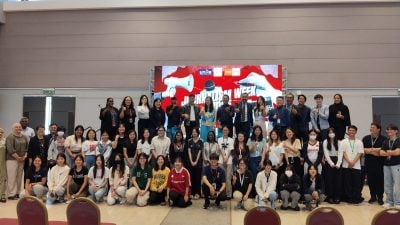MANILA: Nearly four out of 10 jobs in the Philippines are “highly” exposed to artificial intelligence (AI) and its potential to either displace workers or support various tasks to boost the productivity of employees, the International Monetary Fund (IMF) said.
In a country report dated December 20, the Washington-based institution estimated that 36 per cent of jobs in the Philippines are “highly exposed” to AI, which can either replace human workers or “complement“ tasks to boost the efficiency of employees.
The good news is “more than half” of those highly impacted jobs were also rated as “highly complementary” – where AI can augment rather than take over the tasks performed by the worker.
This means that 14 per cent of the total workforce in the Philippines are at risk of being replaced by AI, the IMF warned, adding that the business process outsourcing (BPO) sector might experience shifts amid recent advances in such a technology.
The IMF specifically noted the proliferation of AI-driven chatbots and virtual assistants that now handle more customer service tasks.
More women at risk
IMF staff estimated that roles such as technicians, services and sales, and clerical support have large exposures to AI.
At the same time, these positions may also see the highest risk of job displacement due to the low potential for AI to just provide support to – and not replace – the workers in these occupations.
On the flip side, there are a lot of opportunities for AI to augment the tasks of managers, professionals and machine operators. Workers in craft and trades, skilled agriculture, and elementary occupations were the least impacted by AI.
The IMF also said that AI exposure varies by gender in the Philippines.
It estimated that approximately half of all jobs held by women were highly exposed to the disruptions, compared to a quarter by men.
“It is due to more women being employed as clerical support, service, and sales workers whereas men have a higher share in trades, agriculture, machine operations, and elementary occupations which are less likely to be impacted by AI at this stage,” it added.

Digital investment
The latest country report was a product of the IMF’s 2024 Article IV Consultation in the Philippines that wrapped up early this month.
And the findings were not surprising at all considering how vibrant the local information technology and business process management (IT-BPM) sector is.
For this year, the Bangko Sentral ng Pilipinas (BSP) expects BPO revenues to grow by 6 per cent to US$31.4 billion (RM140 billion).
This means BPO receipts would outperform the growth of other key dollar engines such as remittances, which are projected to expand by just 3 per cent based on BSP forecasts.
The IT and Business Process Association of the Philippines, the umbrella organisation of IT-BPM firms in the country, is projecting a much better revenue haul of US$37.5 billion and for the domestic workforce headcount across the industry to reach 1.82 million by year’s end.
Given the Philippines’ service-based economy, the IMF said the government would need to invest in digital infrastructure and education to ensure that the gains from AI use “are widely shared.”
The IMF also urged local authorities to “strengthen the social safety net” for workers that will be replaced by AI.
“The authorities concur that skills gaps, including those related to Al, and the high cost of power are the biggest bottlenecks to greater private sector investment,” the fund said.
“They hope that joint efforts between the private sector and government agencies to modernise education curriculums, along with greater training for teachers at all levels and use of digitalisation, will improve education outcomes,” it added.
Global impact
The IMF said that AI will have a potential impact on the global labor market, citing many studies predicting the likelihood that jobs will be replaced by AI, but in many cases will likely complement human work.
In its study, it said almost 40 per cent of global employment is exposed to AI.
“Historically, automation and information technology have tended to affect routine tasks, but one of the things that sets AI apart is its ability to impact high-skilled jobs.
“As a result, advanced economies face greater risks from AI – but also more opportunities to leverage its benefits – compared with emerging markets and developing economies,” it noted.
In advanced economies, it said about 60 per cent of jobs may be impacted by AI.
“Roughly half the exposed jobs may benefit from AI integration, enhancing productivity. For the other half, AI applications may execute key tasks currently performed by humans, which could lower labour demand, leading to lower wages and reduced hiring.
“In the most extreme cases, some of these jobs may disappear,” it warned.
In emerging markets and low-income countries, by contrast, AI exposure is expected to be 40 per cent and 26 per cent, respectively, according to the IMF.
“These findings suggest emerging market and developing economies face fewer immediate disruptions from AI.
“At the same time, many of these countries don’t have the infrastructure or skilled workforces to harness the benefits of AI, raising the risk that over time the technology could worsen inequality among nations,” it noted.
ADVERTISEMENT
ADVERTISEMENT








































